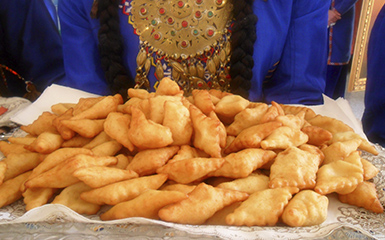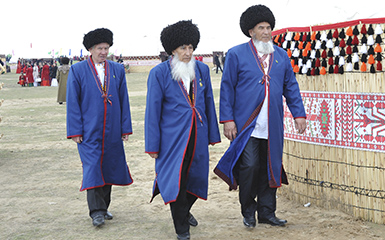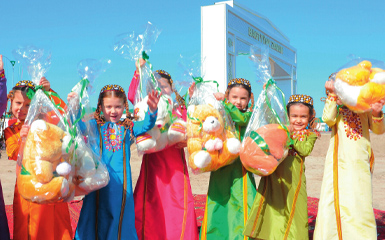A guest comes, happiness comes!
This is what the ancestors of the Turkmen people used to say. A guest was considered a sign of God. Any person who came to aul (a Turkmen village) was offered shelter and food in the first yurt he/she came across. The traveller couldn’t refuse and leave the house without having tasted a warm meal.
Hospitality is characteristic of all Central Asian peoples, and the Turkmen people have it as a code of honour. Hospitality has always had a special meaning and rules, which include the norms of behaviour while visiting and receiving guests, as well as table setting and preparation of festive treats.
Lofty principles of traditional behaviour, including in hospitality and respect for the elders, were fostered from early childhood. These principles were followed during the family meal, where the traditional place of honour (in Turkmen ‘tor’) – opposite the entrance and near the hearth was taken by the elder of the family. This place was given to a guest, as soon as he crossed the threshold. At the same time, children got up from their seats, greeting and expressing their respect to the guest.
Traditional Wedding
The traditional wedding is organized according to strictly established rules. It is a special festive ritual, which includes many customs and traditions associated with the people's idea of family prosperity, hard work, skills, ingenuity of newlyweds, strength of family and social ties. The wedding has always been the most joyous and solemn event, with traditional horse races, national wrestling called ‘goresh’, various national games and performances of singers – bakhshi and musicians. Moreover, the Turkmen wedding and its rituals are full of funny moments, including in taking the bride away from her native house, testing her dexterity and ability to untie the groom's gushak (belt) tied into a tricky knot with a bandage over her eyes, and many others. The wedding maiden songs, as well as the ditties sung by children who move from house to house according to the customs of Novruz (the national spring festival) are replete with wits.
To date, the centuries-old traditions are carefully preserved in modern life of the Turkmen people. For example, having attended a Turkmen wedding in the 21st century, people can see the most ancient rituals, hear folk songs, or take part in national games.


 English
English Italian
Italian Japan
Japan China
China Deutch
Deutch




